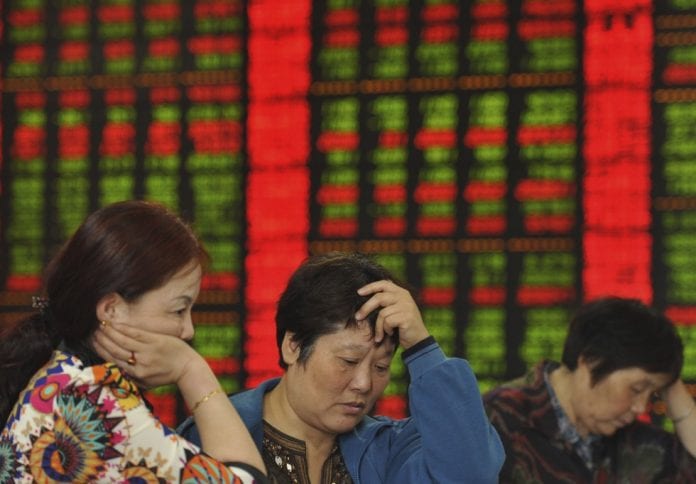Chinese companies trading in the United States such as Alibaba Group Holding (NYSE: BABA), JD.com (NASDAQ: JD), Tencent Holdings (OTCMKTS: TCTZF) and others tumbled amid investors’ concern regarding the collapse of the stock markets in China.
Today, more than 173 Chinese companies suspended trading bringing the total number to nearly 950—more than one-third of all the listed on the two main stock markets in China. The Chinese companies decided to suspend trading to prevent the selloff on the country’s stock markets.
The Shanghai Composite Index dropped 1.29% to 3,727.12 points. The index declined more than 25% in one month. The Shenzhen Composite Index declined 5.34% to 1,932.83 points. The index declined more than 36% in one month.
China’s stock markets already lost around $3.2 trillion of stock value—higher than the size of the entire stock market of France and approximately 60% of Japan’s stock market.
The Hang Seng China Enterprises Index in Hong Kong also followed the footstep of its peers in mainland China as it tanked 3.3% to 11,827.30 today. The index declined 20% from its peak in May 26.
Investors are eliminating risks related to China in their portfolio
Commenting on the collapse of the stock markets in China, Brendan Ahern, chief investment officer at Krane Fund Advisors told Bloomberg, “Investors are fleeing anything associated with China. They don’t want to have anything related to China in their portfolio. Investors are ridding the risks around China, and there is a spillover effect in the U.S.-listed stocks.”
Foreigners are exiting their investments in China after the government stepped up its intervention to prevent the collapse of its stock markets. The Chinese government suspended in initial public offerings and enlisted major brokerages to buy shares worth no less than 120 billion yuan or $19.62 billion (15% of total net assets) on exchange traded funds (ETFs).
Investors’ confidence on Chinese government is declining
On Monday, China’s Premier Li Keqiang emphasized that China has confident and capable of dealing with the risks and challenges confronting its economy. According to him, the country’s major economic indicators stabilized and positive signs are emerging. He added that China’s economic performance in the first half of 2015 was reasonable. However, he failed to mention the current situation of China’s stock markets, which are suffering a deep decline.
Henry Guo, an analyst at Summit Research commented, “People have less and less confidence in the government’s ability to stabilize the financial market. Names like Alibaba and JD.com are, to a certain extent, an indicator in the market, the selloff in these stocks shows the level of bearishness regarding the broader Chinese market.”
Chinese equities tank today
The stock price of Alibaba Group Holding (NYSE: BABA) declined as much as 5% to $76.21 per share to today. The stock closed $79.58 per share, down by nearly 1%. Alibaba lost more than 23% of stock value year-to-date.
The stock value of Baidu (ADR) (NASDAQ: BIDU) dropped nearly 1% to $187.54 per share. The Chinese-language internet search company lost more than 17% of stock value year-to-date.
JD.com (ADR) (NASDAQ: JD) fell more than 4% to $30.61 per share. Earlier this month, Julian Robertson, founder of Tiger Management said he is very bullish on JD.com citing the reason that it “has advantage over practically all the other Chinese companies. He added that the company never had any knock-off problems. JD.com gained over 32% of stock value year-to-date.
Tencent Holdings ADR (OTCMKTS: TCEHY) tumbled more than 3% to $18.42 per share. During the extended hours trading on Tuesday, the stock went up by13% to $20.92 per share. Tencent gained more than 26% of stock value year-to-date.
The shares of Weibo (ADR) (NASDAQ: WB) slid more than 5% to $13.40 per share. The company gained some of its losses after hours, up 2.58% to $13.74 per share. Weibo lost almost 6% of stock value year-to-date.









